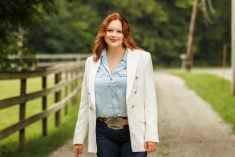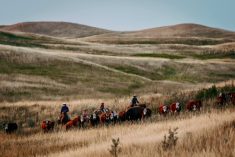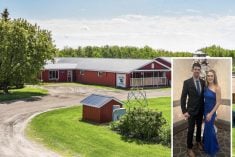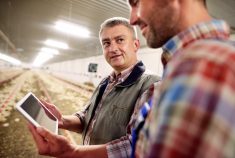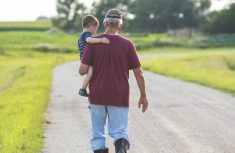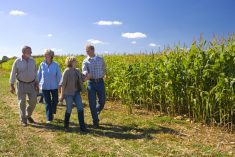Four years ago, Tom and Margaret Towers were facing a dilemma that’s becoming increasingly common for farm couples as they move into what are politely called their senior years.
The Towers knew they couldn’t continue to manage alone forever, and they also knew they wouldn’t want to leave the farm near Red Deer, which they’d spent a lifetime creating.
And while their children love having a connection to the farm, they were away pursuing successful careers.
“Our kids are doing other things, but the land is important to them and we wanted to keep the land in the family,” says Tom, who established Tamara Ranch in 1967 with his wife, Margaret, about a mile from his great grandfather’s original homestead.
Read Also

Lessons from the past: How Canada can reverse its shrinking share of the global food market
A historic look back at how Canada has positively dealt with trade issues — and how those lessons can inform future moves.
“We needed to find somebody who could manage the place,” says Tom. “But it was important that they had the same philosophy as us.”
It wasn’t only the kids they were thinking about. Like others, they were thinking about themselves too, and about their lifetime’s commitment to the land.
- Read more: Finding the right farm mentor
Surrounded by large-scale grain farms, the Towers figured that if they sold their land it would be swallowed up, becoming just another cluster of undifferentiated fields in a much larger crop production enterprise, and they couldn’t bear to think that the things that made their land special might be lost, or that all the work they had put into building soil health, improving the grasslands, increasing biodiversity and retaining natural habitat might be undone.
“We love our land. We’ve been on it for 50 years,” says Margaret. “But what were our options? We wanted to stay on the land, but we didn’t know how to still make an income off the land without selling or renting it.”
Needing land to rely on
Meanwhile, not too many miles away, Blake and Angela Hall were struggling to find a long-term land rental agreement that was stable enough to allow them to grow their grass-fed beef business.
After a year of university, Blake was having a hard time finding the right direction for his life. He had spent a couple of years participating in youth volunteer exchange programs in Canada and Burkino Faso, and had set two goals for himself; to learn how to build a house, and to grow food. “I figured there was probably no harm in learning those two skills whether they led me into a career or not,” says Blake. “I was 20 years old, and not tied down by family or debt.”
Blake spent a summer in Ontario with the CRAFT (Collaborative Regional Alliance for Farmer Training) program that taught him about growing food, and decided to stay in Ontario to start a carpentry apprenticeship. He obtained his journeyman’s certificate five years later, but it was that first summer on the farm that stirred a passion for agriculture.
When Blake moved back to Alberta in 2011 he bought his first small herd — 30 head of mixed pregnant cows and young steers. He also took a meat cutter’s course at Olds College where he met his future wife, Angela, another “townie” with no farm experience, who Blake describes as his happy farming accomplice.
A fateful meeting
The Halls and Towers crossed paths in 2012 when Blake answered Tom’s ad on Kijiji for grass-finish type cattle. When they got together, Tom and Margaret immediately sensed and liked Blake’s outlook, even though he’d grown up in the city.
“We were really impressed with this young man, and we started chatting about what he wanted to do with these cattle, and what he wanted out of life,” says Margaret. “We could see his love for the land and the passion for what he was doing. He wasn’t just playing at farming, he was really serious.”
The cattle were such good animals, Tom wondered why Blake was selling them, and when he answered that he needed to pay his winter feed bill, Tom and Margaret wanted to help. They purchased some of the female cattle and agreed to keep the calves to sell back to Blake.
From there it was a natural progression to ask Blake if he wanted to bring his herd to the ranch and manage it. “We could see that he needed some permanence, somewhere he could put his roots down, raise these animals and keep his business going,” said Margaret.
The Towers suggested a long-term plan to manage 400 acres of their land and also offered to let Blake and Angela move into the modular home on the next quarter on a rent-to-own basis.

The agreements
The Towers and Halls each sign a yearly Farm Services Agreement, which provides mutual protection for all parties and is an umbrella cover for all of the enterprises that operate independently on the ranch.
Tom and Margaret signed an additional five-year Scope of Work (SOW) agreement with Blake and Angela which covers the day-to-day activities that they share on the ranch. “This working agreement gives us the ability to bring Blake into the family operation, and allows him to become a part of it rather than a renter. We, in turn, have the confidence of a long-term relationship with the ability to mentor and impart what we have learned over the last 50-plus years,” says Tom. “We share similar philosophies and can work toward shared goals for the overall progress and success of Tamara Ranch.”
Importantly, the SOW provides Blake the opportunity to ranch with no fixed costs in land or mortgage payments.
Blake runs his cattle with the Towers cattle on 400 acres and pays them an animal day rate while they pay him a per-head day rate for looking after their cattle. This year, the grazing herd comprised 150 head of cows, calves, yearlings and fats, of which Blake owns about 60 per cent. They share costs for hay, straw, salt and mineral based on percentage of ownership of the herd.
“Blake buys our fat beef at a fixed hanging rate, and markets all the fats, including his own, through his company Prairie Gold Pastured Meats,” says Tom. “He pays us a percentage of gross on lamb and pork sales.”
The Towers custom graze a neighbour’s yearling replacement heifers and breed them for him, for which they’re paid on a per-head-per-day basis. They reimburse Blake for the management of them, which includes daily moves and health care. Tom and Margaret still manage the remaining 640 acres which grazes cattle from a local Hutterite colony.
The Towers could just rent their land, but would lose the ability to sustain it in the manner they’ve worked towards for the 50 years they’ve owned it. “The simple rent from the farmable land would pay us about what we are getting from the cattle sales and grazing,” says Tom.
Hiring a facilitator
Even though Blake and Angela hit if off immediately with Tom and Margaret, they were still cautious about jumping in with both feet. “It’s often the human element that leads to a breakdown in the partnership, whether it’s family or not, so we really took our time to decide,” says Blake, who ended up taking the same holistic management course that the Towers had taken in the ’90s.
“I’d seen a lot of farms that were successful, their marriages were intact, they had good family lives, and their common thread was holistic management,” Blake says.
Over that winter the two couples agreed it would be a good idea to hire a facilitator to help them with goal setting and to develop a strong communications strategy, something they knew would be important if their relationship was to grow and flourish.
They invited Kelly Sidoryk, a certified holistic management educator from Lloydminster to come and help them out.
Sidoryk’s role was to help each couple set goals and create their own vision, which she then helped to bring together to form a larger vision that would work not only for the whole operation, but also for all the people involved.
“This is hard work (for them) to do,” says Sidoryk. “It’s harder than building fences or making a financial plan, because you really need to sit down, and be open and communicate your wishes.”
“I really admire the Towers and the Halls for being able to create something unique,” Sidoryk says.
Focusing on goal setting and communication at the start made it easier in the long run, Blake agrees. “That’s when everything is good, and everybody is happy and excited. ”
“Inevitably things arise, and you can’t set up a communication framework reactively,” he adds. “As things come up, we’ve got the respect for each other, and the understanding that we can address those things, and it’s been successful so far.”
The communication strategy isn’t anything fancy. It’s as simple as sitting down together over coffee every Monday morning, talking about what’s going on at the ranch, and sharing ideas to tweak the management, or discuss any small disagreements or grievances that arise.
Blake says he feels lucky to have such a good relationship with the Towers, because he’s seen many of his peers from family farms whose succession planning hasn’t gone anywhere nearly as smoothly, and he’s fairly confident, having met the Towers’ children, that he’ll be able to work with the family for years to come.
Margaret and Tom had no doubt that their son Todd would hit it off with Blake, and vice versa, and they also knew that their desire to see the farm managed according to the ideals that Todd shares with them would hinge on their relationship.
“Todd has always loved the farm, and is totally in sync with what we have done here and the last thing he wants to see happen is the land pass out of the family,” says Margaret. “Todd and Blake are developing a great relationship. They have a similar philosophy, and they truly respect each other.”
Blake and Angela direct market grass-finished beef to private customers in Red Deer and Calgary under their own Prairie Gold Pastured Meats brand. “We have our animals butchered, and we deliver our beef directly to our consumers,” says Blake. “There’s no way that, as a small producer, we could have gotten a start in agriculture if we were trying to get into commodities. With direct marketing we keep our entire margin, and set our own price rather than take whatever price is being given at the auction mart.”
At the bank
As with many young producers starting out, it’s difficult to walk into a bank manager’s office and ask for an operating loan when you have little or no equity built up to back it. The Halls had to be creative to finance their operation. They run a herd share program — similar to a Community Shared Agriculture (CSA) arrangement, where customers purchase a share in the live animal that will provide their meat. This provides upfront revenue and a reasonably stable cash flow through the season.
“It is really the only way we were able to build the business,” says Blake. “When I was starting I was literally laughed out of lenders’ offices.”
A farm ‘incubator’
Interestingly, Tom and Margaret’s arrangement with Blake and Angela has morphed into a kind of “incubator” system which is helping other young people achieve their farming dreams too. They now also rent a seven-acre plot of land to Blake’s brother-in-law, Mike, who is running a successful CSA venture which employs up to five local people. They also have an agreement with another young couple, Sven and Nikki, who raise pastured poultry on their land in the summertime.
Tom and Margaret know what they are doing goes against the traditional retirement plan of selling off the land or re-mortgaging it to the next generation.
“We are trying to give the next generation of young farmers the opportunity to grow food, and it’s amazing how many young people want to do that,” says Margaret.
The model of bigger, bigger, bigger isn’t able to draw those young people back, she says. “We believe in a re-generative model of agriculture that goes way beyond sustainable, which allows these young people to manage smaller plots of land without having to worry about a big debt hanging over their heads.”
The bigger picture should also be kept in view, she adds. “They (Blake and Angela) are growing food for local customers, creating employment and keeping small, rural communities viable and strong.”
Becoming mentors
Through the process, of course, the Towers have had to accept change, they’ve had to get to know someone almost as well as they know their own son without having had a lifetime to spend with him doing that, and they’ve had to learn how to offer advice without smothering. “You have to mentor in a way that you allow the person to feel like they’re not being controlled, that they have the ability to make their own decisions,” Margaret says.
For an arrangement like theirs to work, there needs to be transparency, honesty, good communication, and flexibility, but you also need to change your mindset, Tom finds. “Farmers and ranchers have survived by being independent thinkers, but with a deal like this, you’ve got to change your thinking to interdependence.”
You also have to be prepared to discuss some tough issues, he adds, and one of them is finances, which even many farm families dance around. “We’ve all got to be financially sustainable so we have a lot of those kinds of conversations. We have shared costs, and separate costs, and we have an understanding of what all of those are,” Tom says. “You need transparency with finances.”
Although Blake would love to own land one day, he accepts it’s not likely to happen. “Land prices around Red Deer are so inflated beyond agricultural production value that I just can’t see us being able to own this place without me taking a high paying job in town for the rest of my career and that defeats our whole purpose,” he says.
Blake knows their relationship with Tom and Margaret is special and that it is because of them that he and Angela can pursue their goals of owning their own home and having financial autonomy while farming full time. But there’s something in it for Tom and Margaret too, allowing their agricultural legacy to live on, and giving them a chance to retire as gracefully as they farmed.




